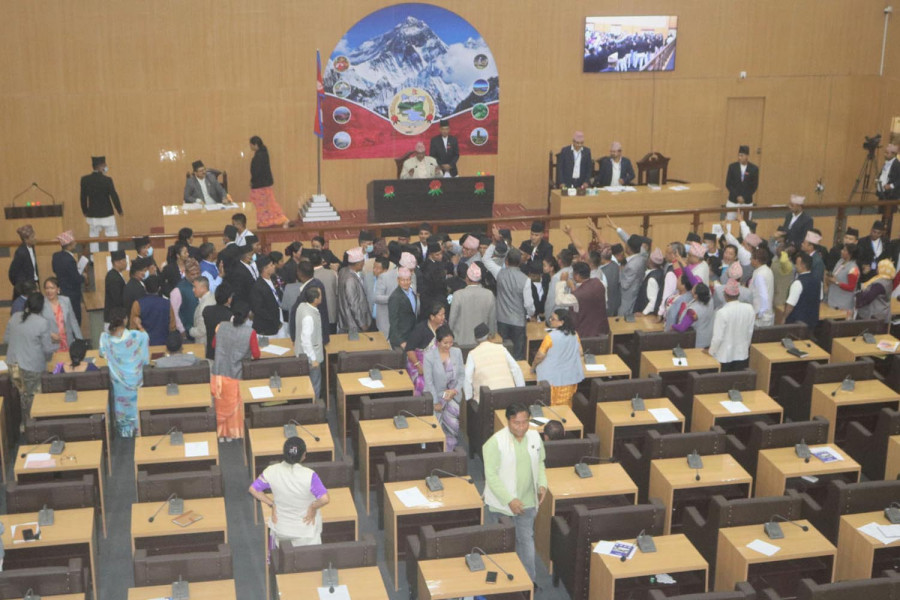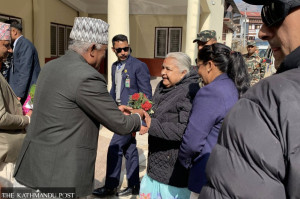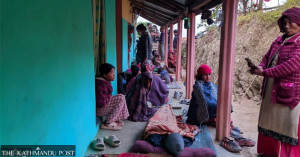Koshi Province
Court rules new Koshi Cabinet also unconstitutional
In its interim ruling, Supreme Court orders provincial government not to make important decisions.
Tika R Pradhan
For the second time, the Supreme Court on Thursday issued an interim order in the name of the Uddhav Thapa-led Koshi provincial government not to take any long-term decision, stating that the vote of confidence secured by the chief minister on Monday was unconstitutional.
With the court’s decision, the Thapa government has now been reduced to a caretaker status just three days after garnering the trust vote.
Bhimarjun Acharya, a constitutional expert, blamed the turn of events in Koshi on the political parties’ irresponsibility. “They invited the current crisis by openly violating the constitution,” he said.
Confusion has gripped the Koshi government once again after the parties–especially the ruling ones—continued to make unconstitutional moves. The previous cycle is expected to be repeated with the Supreme Court likely to order the provincial assembly to form a new government.
“An interim order has been issued in the name of the defendants not to take any decision having long-term implications and of policy nature until the hearing of the petition is concluded as the vote of confidence that Chief Minister Thapa received is not in accordance with the constitution,” reads the order.
If the court, just like last month, issues the final verdict in line with the interim order, the largest party in the provincial assembly will form a new government as per Article 168(3). The provision states that if a government cannot be formed under 168 (2), the provincial head shall appoint as the chief minister the parliamentary party leader of the party which has the highest number of members in the provincial assembly. The chief minister appointed under clause (2) or (3) needs to obtain a vote of confidence from the provincial assembly no later than 30 days after the date of such appointment, it says.
If the chief minister appointed under Article 168 (3) is unable to secure a vote of confidence, then the government can be formed under 168 (5), giving lawmakers a chance to present a ground on which he or she can get a vote of confidence in the assembly. In such a case, the province head will appoint such a member as the chief minister. The chief also needs to secure a vote of confidence within a month.
If all these processes fail to produce a government, the province will have no option but to go for midterm elections. That appears increasingly likely as no political party or alliance commands a majority in the assembly.
On Monday, Thapa, Congress parliamentary party leader, won the confidence of the assembly after Congress’ Israil Mansuri, who was chairing the assembly meeting, voted in Thapa’s favour.
The assembly has a tricky balance of power. In the 93-member assembly, a candidate for chief minister must secure 47 votes to get elected. The coalition led by Nepali Congress has 47 seats in the assembly, but when one of them has to chair the meeting the coalition falls short of one seat to secure a majority. The other alliance comprising the CPN-UML (40 seats) and the Rastriya Prajatantra Party (6 seats) has 46 members.
With the constitutional provision that the person chairing the assembly cannot vote unless there is a tie, things have become more complicated as the opposition UML won’t allow the tie to happen at any cost.
Sixteen lawmakers representing the UML and the Rastriya Prajatantra Party remained absent when Thapa tested the floor on Monday.
As the constitution has clearly stated that the person chairing the assembly meeting can cast vote only if there is a tie, Mansuri took part when there was no tie, which the Supreme Court said was against Articles 168(2), 168(4) and 186 of the constitution, parliamentary practice, constitutional morality and also the principles propounded by the court.
Since the UML has the most seats (40) in the 93-member assembly, the party will try to push the process to Article 168(3).
On Thursday, a single bench of Justice Ishwar Prasad Khatiwada issued an interim order in the name of the defendants not to make any important decisions until the final hearing of the case.
“Since the case needs to be sorted out soon, present the case for final hearing on September 1,” states the Supreme Court’s decision.
Claiming that Mansuri went against the constitution and cast his vote, UML parliamentary party leader and former chief minister Hikmat Karki moved the Supreme Court on Wednesday.
On July 27, the Supreme Court ordered the Koshi Province head and the Speaker of the provincial assembly, among other authorities concerned, to form a new provincial government within seven days, terming the then Uddhav Thapa-led government unconstitutional.
At the time, a full bench of the apex court comprising Justices Ishwar Prasad Khatiwada, Ananda Mohan Bhattarai and Til Prasad Shrestha issued the order, terming Speaker Baburam Gautam’s support to form the Thapa-led government unconstitutional.
The decision of the full bench came in response to the writ petition filed by the main opposition UML against the government formation process in the province, terming it unconstitutional.
Thapa was appointed chief minister for the first time on July 6 as per Article 168(2) of the constitution. With the full bench’s verdict, Thapa lost his position within three weeks. The next day, the UML challenged the ruling alliance’s move to show the majority for government formation by including the signature of the assembly Speaker Gautam.
With the order, the new government was later formed as per Article 168(2) of the constitution. As per the Article, two or more parties should show their majority in the assembly to stake their claim to form a new government.
Province Head Parshuram Khapung had appointed Congress parliamentary party leader Thapa as the new chief minister, based on the claim of the majority with the Speaker’s support.
Thapa was appointed per Article 168(2) of the constitution after he staked claim to lead a majority-based government with the signatures of 46 lawmakers and Speaker Baburam Gautam. Signatures of 29 lawmakers from the Congress, 13 from the CPN (Maoist Centre) including the Speaker, four from the CPN (Unified Socialist) and one from the Janata Samajbadi Party were submitted to the provincial head.
The bench in the July 27 ruling had also defined the role of the Speaker, explaining that the Speaker should be impartial and neutral like a ‘referee’.
Terming Gautam’s support for the formation of the Koshi government unconstitutional, the court said the Speaker of the provincial assembly should remain politically neutral and impartial.
Congress provincial assembly party leader Thapa was appointed the chief minister on August 1 for the second time after the resignation of Speaker Baburam Gautam.
Gautam resigned as Speaker earlier in the day, ensuring that the candidate from the alliance of parties including the Congress and the Maoist Centre will muster a majority to stake their claim to the government.
“The budget of the provincial government will suffer first, then various other problems will arise when the government can’t function fully, further deepening the crisis,” said constitutional expert Acharya.
He added: “Now the constitutional process should be strictly followed—if 168(3) and 168(5) also fail to ensure a new government, the province can go for mid-term polls.”




 13.12°C Kathmandu
13.12°C Kathmandu














